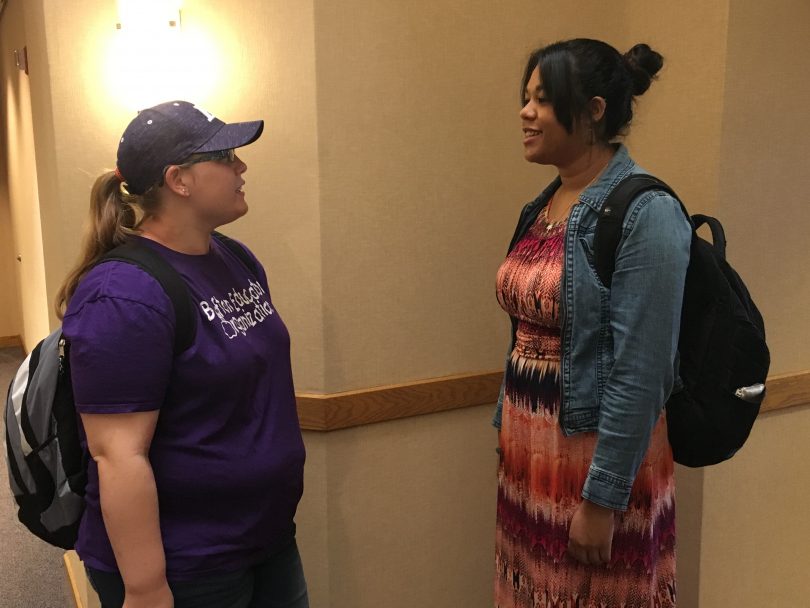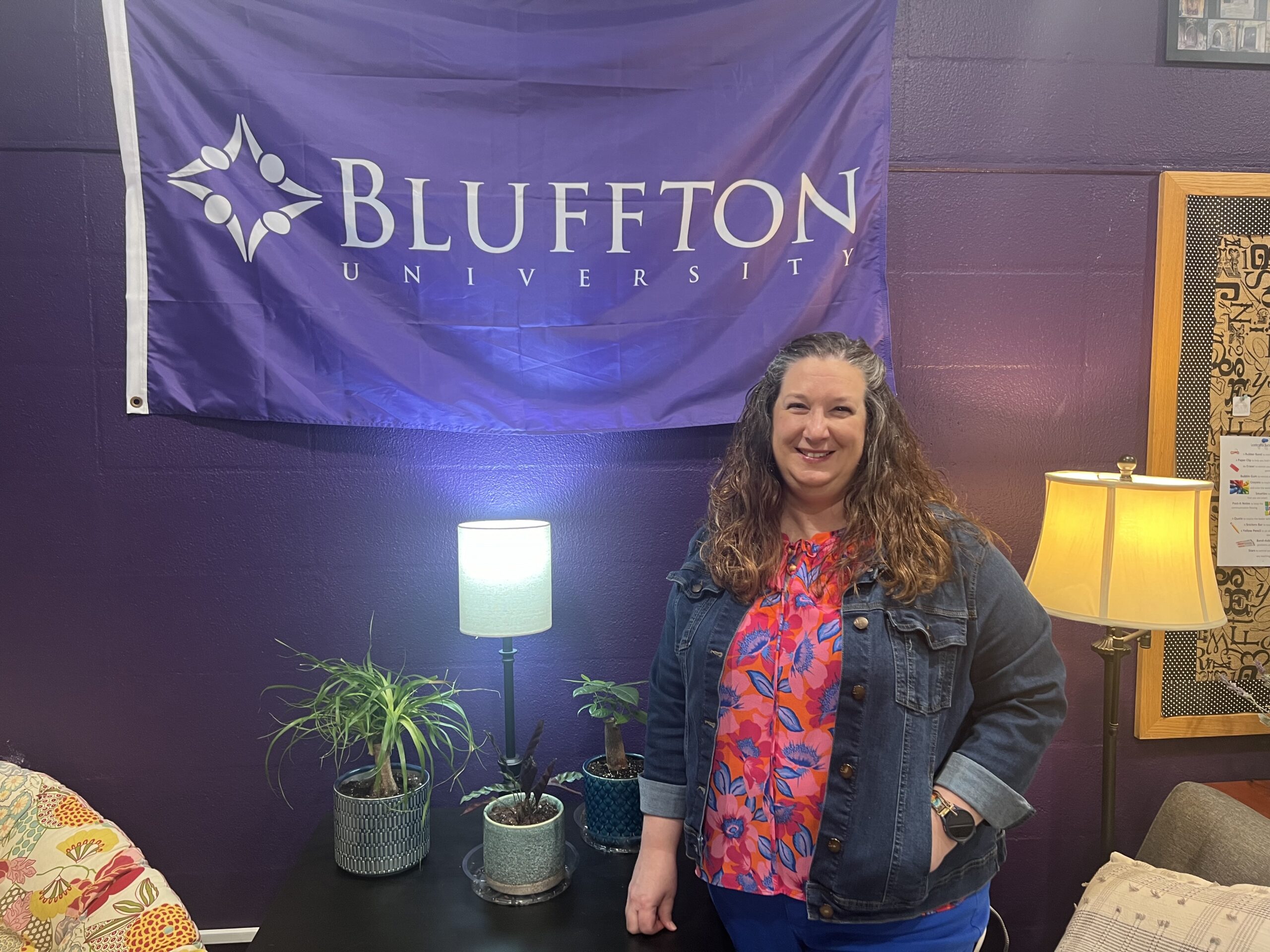From unlocking doors to taking up the mantle of being “the bad guys,” residence life staff at Bluffton have a lot on their plates. Listen as Claire Clay goes behind the scenes to see what it’s like to be a resident adviser or hall director at Bluffton. This is the first in a series of audio features that take a closer look at what happens behind the scenes at Bluffton.
Above: Alexis Edenfield (right), the resident advisor of the second floor of Neufeld Hall, checks-in with resident Logan Neal during the last week of classes. Photo by Claire Clay
CLAIRE CLAY: Hello, Beavers, Claire Clay here with 96.1, The Wit to open the door between residents and resident advisers, as well as hall directors. Living on campus is a unique experience, complete with your own live-in “parents” to take care of all the dirty work on the floor and ensure students are following the rules on campus – or so many people assume.
RAs and HDs are often seen as the “bad guys” on campus, but they’re worth so much more than that degrading label.
However, before you can break down that barrier and stereotype, it’s important you understand the responsibilities they have.
Alexis Edenfield is a senior communications major from, Noblesville, Indiana. She says that common responsibilities for resident advisers include: doing rounds, hosting floor activities, building a sense of community on the floor and being available for her residents.
EDENFIELD: I kinda act as a mediator between residents if there is a conflict, if I happen to be talking to a resident at a time or somewhere on campus and I’m not technically on shift so to speak I can still write referrals towards other students on campus who are breaking the honor code in some way or vandalizing in some sort of negative way towards campus — I guess just there and available for my residents.
CLAY: Eli Herman is the Hall Director for the Hirschy Complex. His responsibilities are a little different than those of an RA.
HERMAN: So I look over two buildings of about 120 students. Primarily, I just make sure things are going according to plan. I look over — I watch over students and respond to any crises that may happen and respond to maintenance requests, and I also have five RAs, and I meet with them weekly just to get check-ins on the building and see how we can improve it and build community.
Eli is a graduate student fulfilling his assistantship requirement at Bluffton. This is how he got here:
HERMAN: Bowling Green’s master program is kindof unique in that in order to be accepted to it you have to have an assistant somewhere else. It can be on their campus or on another campus. So, I went to something called I-days, which is interview days, where I — it’s one day where you do about 20 interviews all in one day, and it’s back to back. It’s a lot of work and it’s tough, but you get to meet with a lot of people in a lot of different areas.
I came to Bluffton, and I wasn’t even expecting to end up here is the funny part, it was just you guys were on my list of you know like my maybes — I wasn’t sure, but I just didn’t hear too much about it because it’s such a small university, and it wasn’t really advertised, and I really struck a chord with the two people that interviewed me, Caleb Farmer and Mark Bourassa, and afterwards they asked me if I’d want to come down, and I said “Oh, sure, yeah, yeah, I’ll come down,” and they were like no we’d like to bring you down right now. So, I actually ended up missing like some of my — the later I-day schedule, which is really just going out for cookies and meeting the other students. But, I had to make that decision I was like, “Well, do I want to give up that and the time I’ll have with other people to check out Bluffton?” But, I came down, and I loved it, and the students were really warm and the university, the campus was beautiful, and all of the faculty and staff I met were very nice and welcoming, but yeah it was a tough call but I ended up going with Bluffton as my top choice, and I found out later that I was their top choice, so that was good to know.
CLAY: RAs and HDs are much more than the residence hall police. Brittany Huff, an education major from Dayton, Ohio, views her job as a community builder, although some challenges do arise.
HUFF: Well, I love the aspect of doing floor events, and I love being crafty, so I love the bulletin boards and the door decs, but the floor events really bring people together because we get different people every time we do a floor event, and so I really like creating that community aspect of it all. It is harder to be an RA for people you’re close with because there is a line between being a friend and an RA and having to do your job, but most of the time it becomes pretty easy because if I explain to them right out front like “OK, I have to do my job but I still want to be your friend,” a lot of them do understand, and they do get that.
CLAY: Jena O’Brien, a public relations major from Toledo, Ohio, is one of two RAs on the third floor of Ramseyer Hall. Her perspective on being an RA sheds the perfect amount light on the situation.
O’BRIEN: I think that the reason why we’re seen as the bad guys on campus is because growing up you’re always used to having parents telling you what to do and what you can and can’t do. So, then coming to college as a place where you’re supposed to learn and discover more about yourself and having people there directing you to live a lifestyle that benefits community better can seem like they’re playing that parent role again, so that’s why I think we’re sometimes seen as the bad guys because we’re always telling you guys the things you can and can’t do and usually telling you what you can’t do, and I understand it can be frustrating because you want to be able to do what you want, but at the same time you have to remember we’re living in a group community.
CLAY: Jena believes that by simply having a conversation with them, the relationship between RAs, HDs and residents can be mended and strengthened.
O’BRIEN:I think honestly if residents just took the time to actually talk to us, they would realize that we’re in the exact same positions as they are. We’re athletes; we’re students; we’re employees, just trying to — we’re doing the exact same thing as you guys are doing it’s just we have this extra responsibility, and so I think if they just took the time to really sit down and see things from our perspective, they would realize that we’re not trying to get them in trouble, we’re just trying to make sure we can make the community a better place and live up to our standards at Bluffton University.
CLAY: In a similar way, Eli wishes students realized that being the “bad guy” isn’t fun for the residence life staff, either.
HERMAN: I think the biggest or maybe the most challenging aspect or something I want students to know is just the policing aspect of what we do. The way I see it is I’m looking over a community and I have their best interests in mind, so whenever students are doing something that’s you know maybe a disturbance to the community it’s never fun, and of course, no RA and no hall director wants to go deal with that and have to be the bad guy, but we do it for the good of the community and we do it to keep the roles in place. It’s just something we have to do, so yeah, yeah, even though they’re tough conversations, I guess if there’s something I wanted students to know is even if a hall director or an RA is having to have a tough conversation with you, that’s not usually something they particularly want to be doing either, but we hope that it works to develop them and you know they can learn and grow as an individual from it.
CLAY: A major source conflict on campus revolves around open hours vs. closed hours. Those who support either side have made strong arguments, but what about those who actually have to enforce the rule?
O’BRIEN: In terms of being an RA, I personally think having open hours would be a little bit easier just because a lot of times when I’m doing rounds, and I have incidents with residents it’s involving open hours. So, I think if we just eliminated those that would eliminate a lot of referrals, too. But, at the same time I could see where the university would want to keep it.
CLAY: Referrals and conflict solving are not often the reasons students want to become RAs. In fact, many RAs and HDs apply and accept the job because of the professional development they gain from it.
HERMAN: So, I work in student affairs, which is basically college administration, and I tell people it’s everything on campus that’s not being a professor. So hall directing is kind of a great gateway to a lot of careers because it gives you experience in a breadth of options within a university. You’re working with almost every department. It gives you good experience and good leadership position when you’re supervising students which is always good experience to have, as well. So, I know that no matter what I go into into my future it will be an experience that will you know give me a starting block — somewhere to start from.
HUFF: Being an RA keeps me on my toes for sure because I have a lot of different things that happen that “OK, it may not be in my schedule today to do this but I gotta react” and that’s actually something I have to do with my job in the future because I’m becoming a teacher, and so being a teacher is somebody that has to organize things and big groups of people, but also if something doesn’t the perfect way that you want it to you do have be reactive, and so I think this job is helping me in this aspect and like getting to know different people with different personalities and trying to keep them all in a group, as well as realizing they all are different.
CLAY: You are probably thinking, “they’re just saying this to make themselves look good,” but have you actually talked to your RA about it? Have you talked to them at all in the last week? RAs and HDs are here to help and build a relationship with you, are willing to build one with them?
This is Claire Clay and thanks for listening to 96.1, The Wit. For more stories and information, log onto blufftonwit.com or follow at-blufftonwit on Facebook, Twitter, Instagram and Snapchat.
Podcast: Play in new window | Download







